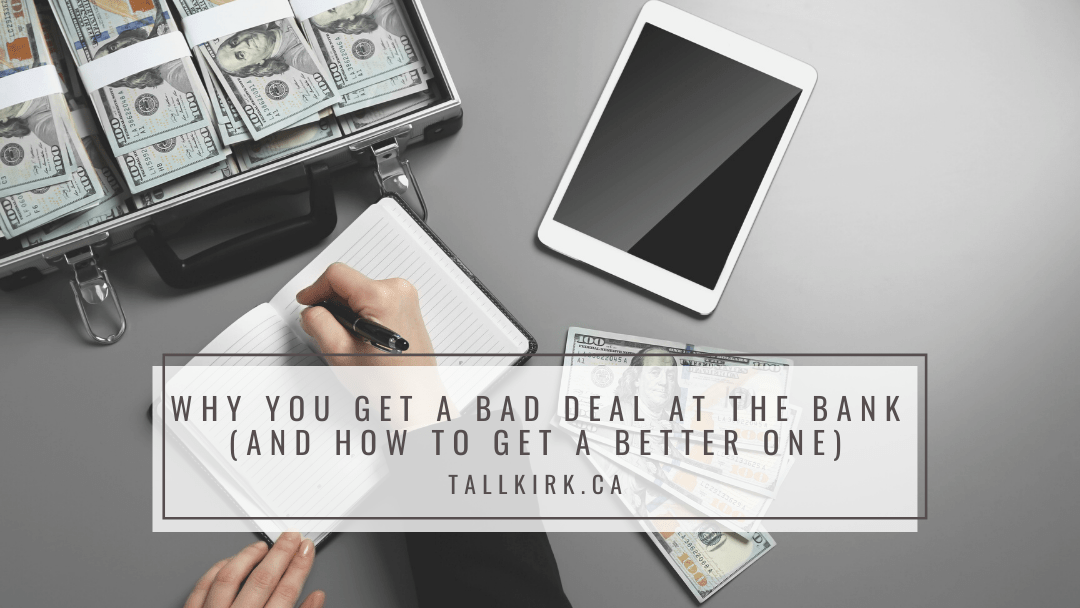Banks are good and useful. They’re also terrible and parasitic.
When’s the last time you asked whether your bank is taking more than it gives? When’s the last time you considered whether you’re getting a good deal?
You likely don’t ask these questions often, or ever, because you don’t think you have other options anyway.
I’m here to let you know you do. We’ll get to that in a second, but first…
Why the Deal You’re Getting at the Bank Sucks So Hard
There are a bunch of reasons the bargain you’re making with the bank isn’t great.
It’s hard to start a bank, so there’s not much competitive pressure. You’ve likely been with your bank for a long time, so there’s trust there, maybe even a sense of loyalty.
They know it’s a huge hassle for you to switch. They know you don’t pay that much attention to the various fees on different products. They know you don’t go shopping around every year looking for better options.
And frankly, their interest isn’t always aligned with yours. They want you to carry a balance on your line of credit and credit card. Why do you think they’re always sending you emails about increasing your credit limit?
They’re happy to extend your mortgage term and lower your payments to help you make ends meet in the short term because that means they make more in interest over the long run.
It’s not that they’re evil or ill-intentioned. They would say it’s just good business. They know they have a loyal customer who won’t go through the trouble of going elsewhere and have no real incentive to give you a better deal.
Let’s take a closer look at your deal with the bank.
Likely every dollar you make flows directly into your bank account. So you’re giving the bank a steady stream of deposits.
You likely also have a balance of some kind in your checking account and maybe another balance in a savings account in case of emergency or for your next vacation or whatever. That money sits there, earning basically no interest at all.
They then take those deposits and turn around and leverage them to make loans and investments of various kinds.
So not only do you deposit money at the bank, but you also likely loan it from the bank. You might have a credit card, line of credit, car loan or mortgage, which they happily charge you an interest rate of anywhere from 2-20% to receive.
So you give them money, they pay you no interest. They turn around and lend it back to you, you pay for the privilege.
And not only that, you also get to pay them $15 a month just to have an account! Plus any overdraft fees, or the creditor’s insurance they’ll try to sell you, or the fees on the new account they’ll encourage you to open. The list goes on.
It’s no surprise why Canada’s big banks earn billions in profits each quarter. You ever remember seeing a penny of that profit?
Shouldn’t your bank be the one paying you?
How to Get a Better Deal
First, I always encourage people to switch to banks with free checking accounts. Yes it’s a hassle in the moment, but getting rid of the monthly fee is a step in the right direction.
Second, I always encourage my clients to shop around, especially when it comes to mortgages and mortgage renewals. If you allow your mortgage to automatically renew at the end of each term, you’re almost certainly leaving money on the table. If you don’t negotiate, you’ll pay far more in interest than you should.
But those are really just baby steps. The real way out is to build your own bank.
Besides the huge corporate profits, another reason you’re getting such a bad deal at the bank is that you’re paying for all their overhead, their tellers and their rent.
What if, instead, you could set up a system where you make deposits into an account you own, you get to keep all the interest earned, receive dividends each year, and can loan the money back to yourself on your own terms?
What if you could recapture all that lost interest you’re currently paying to the bank, and instead make those payments to yourself? What if you could recapture all that lost cash flow you’re currently giving to the bank and instead earn interest on those dollars each and every year?
That’s all possible with what I like to call the Whole Life Wealth Building system.
The details of how exactly you would get started using this system will depend on your financial situation, but the fundamentals remain the same.
You start depositing money into a Whole Life Insurance policy. Those dollars start earning interest and never stop until you die.
Then you start taking loans out against the cash value in the account to make purchases and other investments. When you’re just getting started you can use the money to pay annual bills and then move on to bigger purchases like appliances, cars, tuition, house repairs and so on.
And finally, instead of making payments to the bank, you make payments back to yourself, so that all your cash flows back to you where you can use it again, instead of always flowing to your bank. You get to be the bank, you get to grow your capital, and you get to be the one who decides the terms.
Sounds good. Too good to be true?
The reason this isn’t too good to be true is that banks do require capital. You need cash to get started. So in the early years, you will have to make the initial investment to capitalize your own bank.
But that early pain will lead to immense long-term gain. You’ll be setting up a system that will eventually pay for your retirement and in time create generational wealth for your family so that you’re no longer reliant on banks at all.
In fact, wealthy families like the Rothschild’s have been using a system like this to continue building their family’s wealth for decades. Even the big banks themselves use a version of this system to build wealth inside their company.
So you’ll be building wealth exactly like the wealthy. And you’ll finally be getting the deal you deserve.
If you’re interested in learning more about how you can get a better deal and start using this system yourself, you can check out this blog post about how I’m putting this idea to work in my own life, or you can book a meeting with me directly and we can chat more about it.

